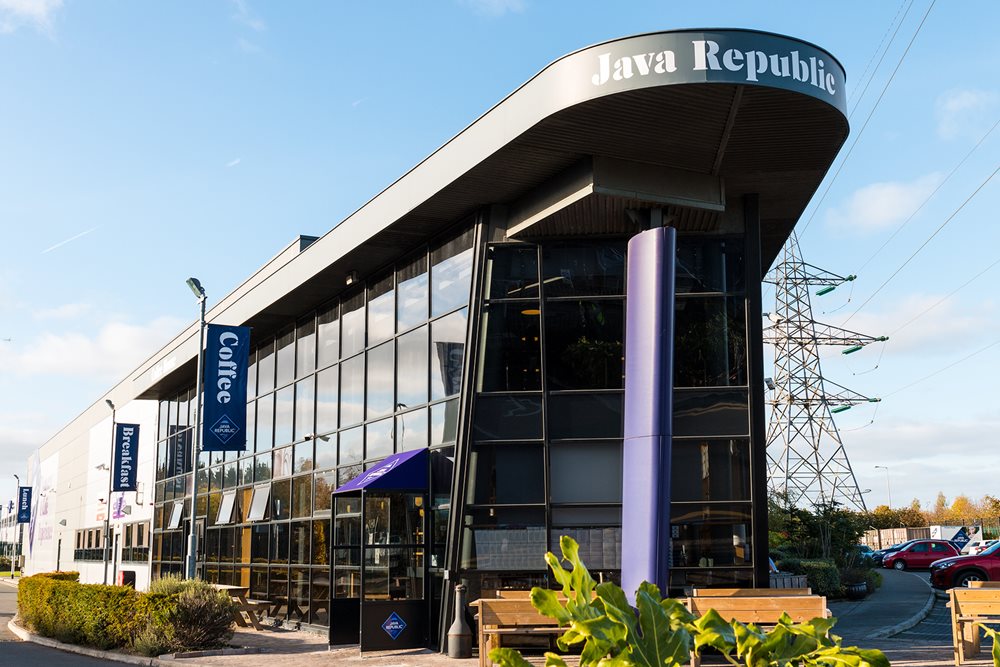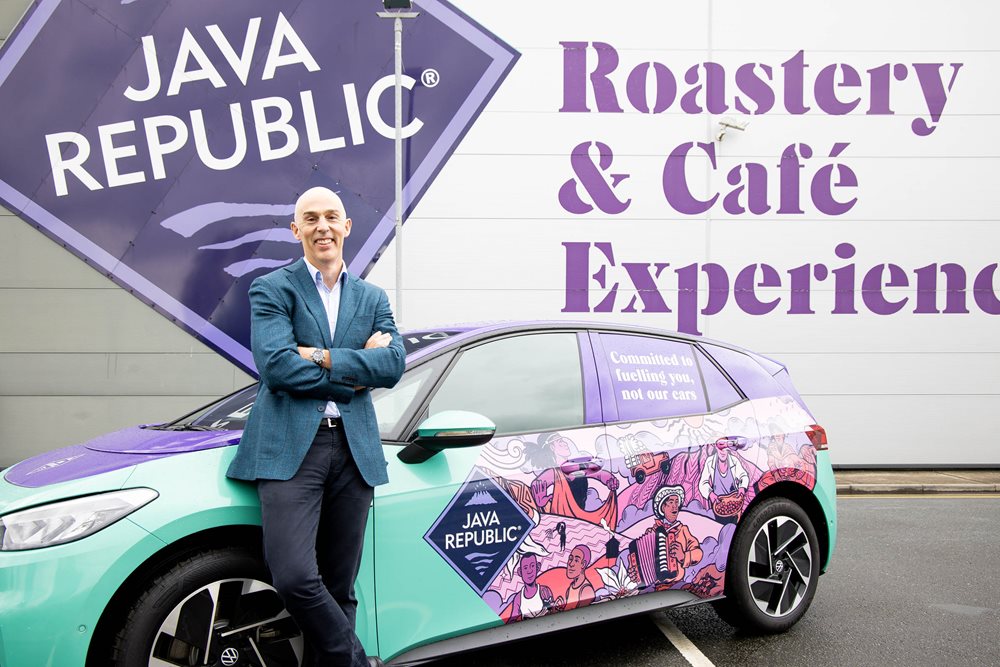It’s 25 years since Java Republic started its rebellion against low-quality, unethically sourced coffee in Ireland. Today, the Dublin-based specialty coffee roaster continues to advance as a leading light for sustainability in the specialty market. Michael Lyons caught up with Managing Director Jeffrey Long to reflect on a quarter-century of excellence and why Java’s resolve to forge a better coffee industry is stronger than ever
-(1).jpg.aspx?lang=en-GB)
Java Republic’s headquarters and Roastery Café in Ballycoolin, Republic of Ireland | Photo credit: Java Republic
Founded by David McKernan in 1999 with a mission to raise the profile of premium, ethically sourced and sustainable coffee, Java Republic has become one of Ireland’s largest and most recognisable specialty coffee roasters. First joining the business as Finance Director in 2008, Jeffrey Long has overseen many of Java’s most important operational roles, including procurement, logistics, production, service, quality and café operations. Serving as Managing Director since January 2023, Long is now spearheading Java Republic’s next phase of growth with sustainability at the core.
In 2008, Java Republic opened the world’s first purpose-built carbon neutral roastery and today roasts more than 610 tons of coffee annually – which it distributes direct-to-consumer, across two company-owned cafés and to more than 1,200 wholesale clients, including Dublin Airport, LinkedIn and Center Parcs.
The eco-design of Java Republic’s Dublin headquarters and roastery building has saved 4.03W/m2k in thermal transmittance to date, with its 315 solar panels collectively producing 100,159 kWh of energy per year – over 40% of Java Republic’s total energy requirements.
What have been key milestones since you joined Java Republic in 2008?
The opening of the world’s first purpose-built carbon-neutral coffee roastery reinforced our position as a sustainability leader and set a new standard for the coffee industry in Ireland. In the decade and a half since we have made remarkable advancements in product development and have consistently set market trends by introducing new coffee blends, specialty teas and a range of seasonal beverages.
“Specialty coffee has become a key differentiator for cafés, restaurants and hotels”
In 2019, Java Republic joined forces with third-generation Spanish coffee business Cafento – a move which brought fresh investment and enabled us to scale our operations, further invest in product innovation, strengthen our sustainability efforts and survive Covid-19. Thankfully, the business has returned to pre-pandemic levels, but this challenging time also sparked a transformation in our online retail offering.
What started as a limited product offering has now expanded significantly, including not only our core coffee and tea range but also home brewing equipment, reusable drinkware, and even sustainable soap made from repurposed coffee grounds. Additionally, we have enhanced our focus on our people. In 2024 we completed an initiative to have all staff, from finance to marketing and everything in between, complete the SCA Barista Foundation course.
What does carbon neutrality look like at Java Republic today?
The goal from inception was to create a business that was conscious of its environmental impact. In 2023, we installed 315 solar panels on the roof of our roastery – a move which generates 43% of our energy requirements annually.
All our lighting is LED and we operate a zero waste-to-landfill production facility with all coffee chaff repurposed into garden mulch. All single-use packaging in our roastery café is either compostable or recyclable and all our foodservice packaging is 100% recyclable.
.jpg.aspx?lang=en-GB)
Jeffrey Long pictured with one of the specialty coffee roaster’s electric vehicles, which will make up the business’ entire fleet by 2026 | Photo credit: Java Republic
“All our lighting is LED and we operate a zero waste to landfill production facility”
The lion’s share of our CO
2 emissions come from gas-powered coffee roasters and motor fuel. We have begun to electrify our fleet with a goal of full electrification by the end of 2026. We are exploring the development of induction coffee roasters as electricity would be a cleaner, more energy-efficient option than fossil fuels for coffee roasting.
What have been some key supply chain learnings from the coffee producers you work with?
It is very important to us that the coffee we buy is traceable, the supply chain is fully transparent, and that the product is high quality. The best approach to fully understand the needs of our farmers is to meet them face to face. Over the years our team has travelled to Brazil, Colombia, Costa Rica, Ethiopia, Indonesia and Rwanda.
In 2025, I will embark on an origin trip to Brazil to strengthen ties with our partners there and get a first-hand understanding of the material impact poor weather is having on the harvest and yields for the farmers.
What drove the decision to expand your specialty coffee range?
The decision to expand our specialty coffee offering was primarily driven by evolving consumer preferences and our commitment to innovation. The pandemic significantly altered consumer habits, with people spending more time at home and seeking high-quality coffee experiences comparable to their favourite cafés. There’s more awareness now of coffee origins, ethical sourcing, and brewing techniques, with more individuals seeking distinct flavour profiles and single-origin offerings. This demand is reflected in the increased purchase of home brewing equipment and premium coffee beans from our web store.
Specialty coffee has become a key differentiator for cafés, restaurants and hotels in attracting and retaining customers. Wholesale customers increasingly prioritise quality and sustainability, with many seeking to enhance their menus with unique blends and single-origin coffees that tell a story. Offering specialty coffee allows businesses to cater to a more discerning clientele while commanding higher margins.
How does Java Republic use its two coffee shops to inform and test innovation?
Our coffee shops in Dublin are dynamic spaces where we can test new ideas, gather feedback and refine our offerings, before introducing them to our broader B2B audience.
One notable change in customers’ orders is the rise in popularity of cold coffee beverages, which are becoming a year-round staple. For example, we saw a 71.5% year-on-year increase in iced coffee and cold brew orders in our cafés during the first nine months of 2024.
We invested in Marco Beverages POUR’D cold coffee dispense systems for both of our cafés and are also trialling a boxed espresso-strength coffee concentrate from New Zealand. This solution will empower our B2B customers to cater for the ever-evolving consumer demands seamlessly, whether it is espresso-based cocktails, caffeinated shakes, tiramisu or cold brew.
This article was first published in Issue 23 of 5THWAVE magazine.
Subscribe to 5THWAVE to receive each edition in print and digitally or sign up to our newsletter and be the first to read the latest articles and updates on World Coffee Portal research.
.png.aspx?lang=en-GB)